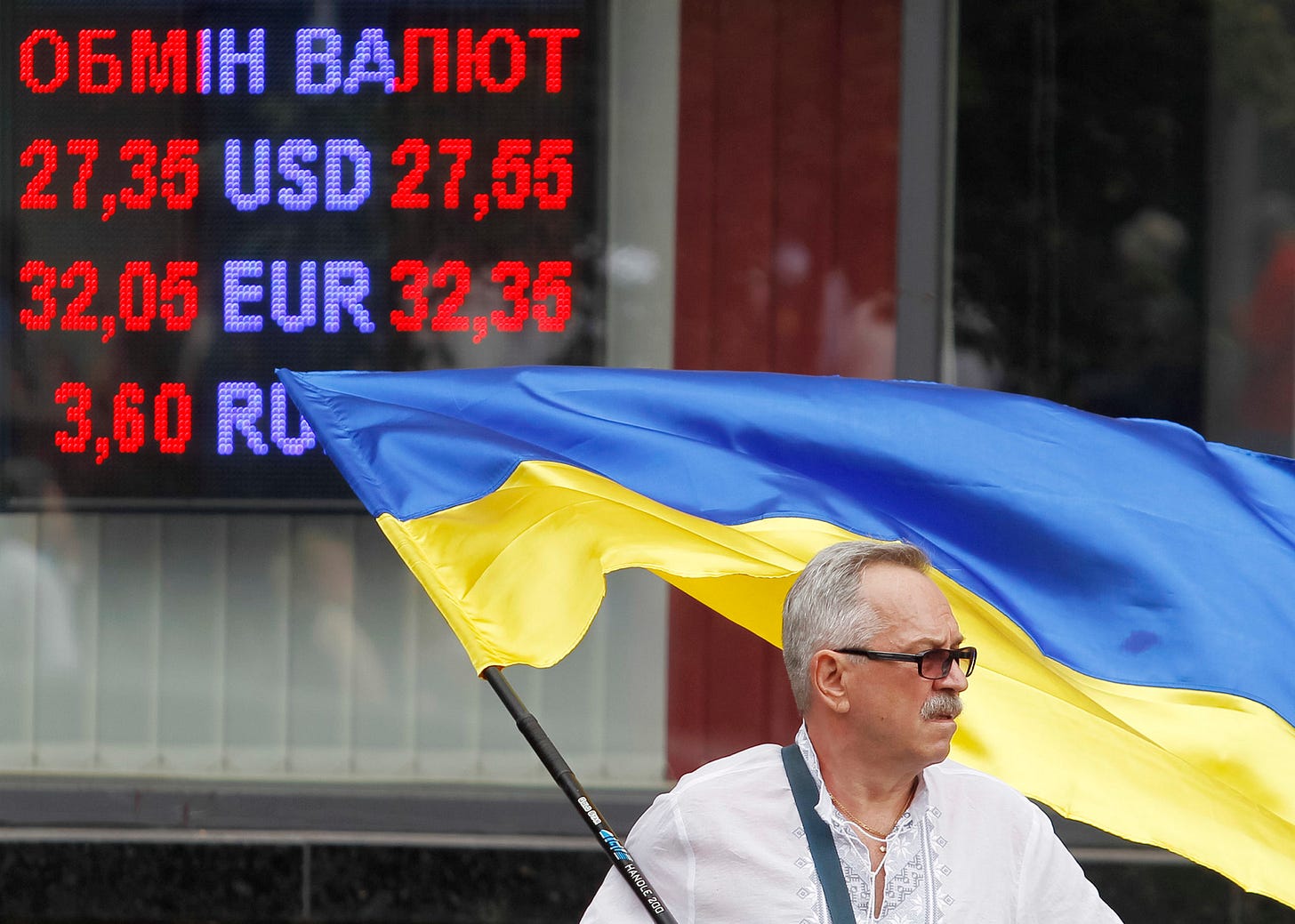We Need ‘Compensanctions’ for Ukraine
How to make Russia pay for the eventual rebuilding of Ukraine.

The West has lined up in support of Ukraine with an intensity that has surprised Vladimir Putin almost as much as we have surprised ourselves.
For that, we owe a debt to the Ukrainian people, not just for fighting on our behalf—because, make no mistake, that is exactly what they are doing—but for acting with a commitment, integrity, and bravery that has both shamed and inspired us. After a shaky start, most of the world has come together with unprecedented unanimity and speed both in support of Ukraine and in condemnation of Russia. We’ve now imposed exceptionally tough economic sanctions on Russian companies and oligarchs that will ultimately result in the seizure of billions of dollars in assets.
But there’s a problem. Normally, the property seized and the fines levied when enforcing sanctions go to the country doing the enforcing. That’s not appropriate in this case. Other countries should not be profiting from sanctions that are being imposed because Ukrainian cities are being turned into rubble by Putin’s war machine.
And that’s where compensanctions come in, a word you’re going to be hearing a lot in the near future.
The idea behind compensanctions is not just to deter bad behavior, but to help remedy its effects. Countries throughout the world are already imposing sanctions on Russia and on the Russian oligarchs who prop up Putin’s regime even as they profit from it. In many cases, those sanctions will result in assets being seized and criminal and civil fines being levied. Under a compensanctions regime, instead of going to the country imposing the sanctions, the profits from fines and seizures would be held in trust for the benefit of the people of Ukraine and used to help rebuild Ukraine once the war is over.
We already do something similar in the United States with the Victims of State Sponsored Terrorism Fund. The fund is designed to compensate victims of terrorism who have secured a judgement in federal court against one of the countries the U.S. has designated as state sponsors of terrorism. The compensation provided by the fund is primarily financed by fines and forfeitures recovered from people and companies that have been caught doing business with that same group of state sponsors of terrorism who caused the harm in the first place.
Despite its limited funding sources—only four countries are currently designated as state sponsors of terrorismÚ Cuba, Iran, North Korea, and Syria—the fund has paid out over $3 billion to victims of terrorism since it began making payouts five years ago.
The Department of Justice is dead serious about vigorously enforcing new sanctions against Russia and has introduced “Task Force KleptoCapture” to do it. As Deputy Attorney General Lisa Monaco put it, “Oligarchs be warned: we will use every tool to freeze and seize your criminal proceeds.”
The $3 billion dollars from the Victims of State Sponsored Terrorism Fund will be a drop in the bucket compared to what is likely to be recovered through the KleptoCapture program. Russian oligarchs have sunk more than $3 billion dollars just into their yachts. In 2017 a study, co-authored by Thomas Picketty, concluded that Russian oligarchs have $800 billion stockpiled in various countries around the world. That number has only increased over the last five years.
To put these numbers in perspective: $800 billion is almost twice the size of the current GDP of the four countries on the state sponsored terrorism list, combined. Ukraine’s GDP in 2021 was about $150 billion. In 2022, thanks to Vladimir Putin, it will be a small fraction of that. So even $10 billion dollars of freshly-laundered oligarch cash seized under a compensanctions regime would go a long way towards helping Ukraine get back on its feet once this war is over and Russia has been defeated.
Compensanctions are already starting to show up in proposed legislation in America. But compensanctions can—and should—be imposed by any country that is sanctioning Russia for its attack on Ukraine. And it’s easy to do. A country merely has to amend the sanctions regime it is already implementing to segregate proceeds from those sanctions and administer them for the benefit of the Ukrainian people. Countries can then use their existing foreign aid mechanisms to dispense the funds to Ukraine when and how they see fit. Compensanctions could even help support the Ukrainian refugees— over one-and-a-half million of them so far and mostly women and children—already forced to flee Ukraine to escape Putin’s bombs.
Ukraine needs our help not just now, in the immediate crisis, but once the immediate crisis is over. Not only is using assets confiscated from Russia to help rebuild a vibrant and democratic Ukraine poetic justice, it’s a vote of confidence in the people of Ukraine and their future.
Compensanctions are a way to guarantee Ukrainians that once the shooting stops, the rebuilding begins.

